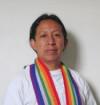Dichter
Fredy Chicangana

Fredy Chicangana
(Colombia, 1964)
© Amaiwii Teksi
Biografie
Born in the Yanakuna county, in the south-east of the country, Fredy Chicangana whose Quechua name Wiñay Mallki means “root that remains permanently”, considers himself a poet and an oralitor, a word he created to express his self-appointed role in uniting the oral tradition of indigenous cultures with what is written. Since childhood he has taken part in helping his indigenous peoples in the struggle to defend Mother Earth. In 2001 he was a founding member of a movement to strengthen “the places of knowledge and words” of his ethnic group. His poems have been published in many national and international reviews and newspapers and have been included in several anthologies of indigenous Latin American and Colombian poetry.
Another theme is the root exposed to the light — representing the presence of memory, as a sign of the hidden part of history that emerges from the shadows, in its true form. These important signs and voices have been silenced in the culture. The poetry of Fredy Chicangana is formed in the “jungle school” where the great native leader Quintín Lame said he studied, the school of analogy with the natural elements that has been followed by the Yanacuna people.
The professors in the indigenous university are the sun, the rainbow, the ants and the birds. The sun is a ceremonial professor who appears in Chicangana’s poems in a ritual dance with smoke, but also in a dance representing the struggle for the land of the reservation. The sun in his poetry disguises itself as water, as a wet dog, and hides in its own light, being the strength of the that deadly violence which is man’s domination of the environment.
Analogical thought, so disdained by science and so close to poetry, goes on feeding native cultures; it is an undivided way of thinking that expresses the first anguishes of man but also the light of his first awakening as he celebrates life and all-encompassing nature.
Poetry is another way of narrating time, not through historical chronicling but through the presence of the live elements, for life itself is time expressed in silence. As Chicangana says: “history is so miserable / that rivers prefer to keep silent.” This poetry shows us that time counted since the beginning is not anthropocentric and goes back to the myth of eternal return which according to Nietszche is the affirmation of life, rather than the submission of man and of life to final causes, which is precisely what has led to the crisis of modern civilization.
His voice will then speak for all, not only for man, but also in the name of rivers, serpents and doves, or better still, the elements themselves are their own voice: “Let the rivers speak from their agony.” The poet is no longer a medium, but the one who sees and hears, he who no longer has anything to say because the elements say everything through their presence, their silent permanence and their violence. The elements are their own signs in a world that is no longer divided between the abstract and the concrete, the immaterial and the material, but is revealed through itself: “I, / son of the ancestral lands, / have nothing to say. / Everything has been said.”
© Álvaro Marín (Translated by Nicolás Suescún)
Bibliography Taquinam Cuyaypa manchachipak huañuyman, (Songs of Love to Drive Away Death) hand printed by the Foundation Sol y Serpiente de América, Bogota, 1992
Kinde tutamanta yaravi nina (The Humming Bird of the Naked Night and Other Songs of Fire), hand printed by the Foundation Sol y Serpiente de América, Bogota, 1992
“Ñuka Yanacona, shimi yuyaipas (I, Yanacona, Word and Memory) (prose), hand printed by the Foundation Sol y Serpiente de América, Bogota, 1992.
Links
http://www.festivaldepoesiademedellin.org/pub.php/es/Revista/ultimas_ediciones/51_52/freddy.html
Homepage International Poetry Festival of Medellin. Poem and biography in Spanish
http://www.etniasdecolombia.org/arte.asp
Etnias de Colombia Home page. Poem and biography in Spanish.
http://www.revueliberte.ca/261_chicangana.html
Revue Liberte (no 261 / nº 3 / September 2003). Poem in Spanish and French.
Gedichten
Gedichten van Fredy Chicangana
Sponsors
























